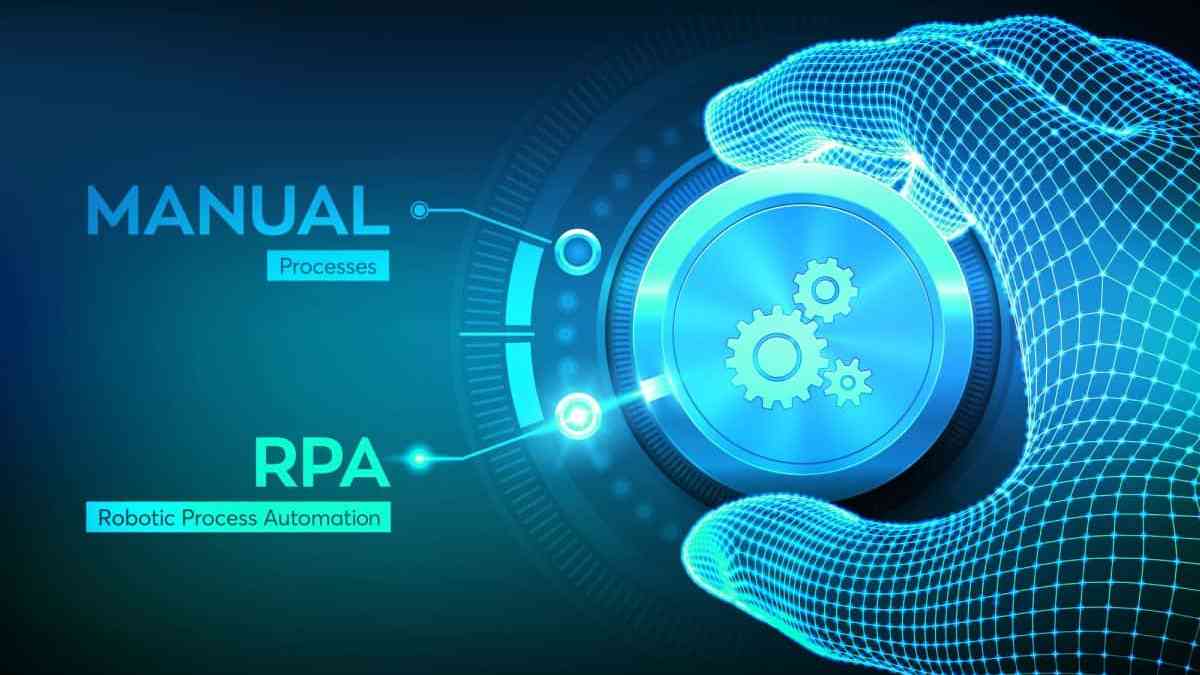
It is happening already – robots are taking over. It may seem exciting at first, as the current reality looks like part of a science fiction movie. But as you pay closer attention to it, it may also be scary. It depends on how you see it, but also on when the humankind will do something to retain control. RPA books are here to help to find our what this reality really is.
These days, you can see self driving vehicles that will follow every rule – you can sit and enjoy some food or watch a movie while the car drives by itself. Large supermarkets rely on robots to pick up online orders and the list can go on.
Whether you want to find out more about how it works, you need to educate yourself on the potential advantages and dangers in the long run or you are curious about a few myths, here are some of the best RPA books about the robotic process automation.
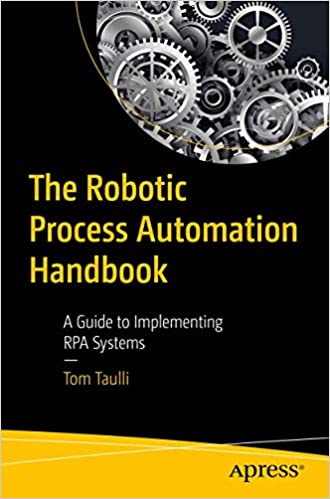
The Robotic Process Automation Handbook, by Tom Taulli (2020)
While RPA has been used for roughly 20 years, it’s reaching a saturation point thanks to its general availability, particularly in the cloud; big data; and artificial intelligence. This book shows you how to apply RPA efficiently to your own business. For instance, you can automate a repeatable, rules-based process, such as scheduling, data input/transfer, form filling, and copy and paste operations.
What makes the technology so effective, including case studies and industry-specific best practices, is the way that it contributes to a company’s overall ROI (Return on Investment). By comprehending the nuts and bolts of RPA, you’ll see that the technology results in significantly greater savings.
The Robotic Process Automation Handbook contains all the information you need to become a part of this wave.
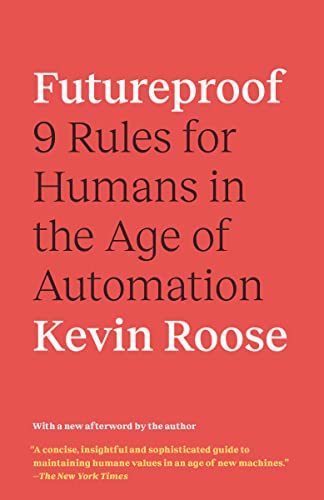
Futureproof, by Kevin Roose (2021)
Kevin Roose provides a crystal clear vision on how technology will affect the world. Furthermore, in a world where technology moves on faster than people, learning how to adapt is just as important – the truth is most people are overwhelmed and lose the battle with it. This book brings in nine rules to survive in the age of technology and thrive when it comes to robots taking jobs and souls over.
The guide provides a hands on approach. It is not a general guide that anyone can find for free over the Internet. Instead, the author describes automation and its incredible benefits. The general idea is that making yourself more human could help you thrive. The guide is counterintuitive and while most people believe the opposite, the author will make some excellent points about his idea.
No one can deny it – machines are here. Advanced artificial intelligence and automation have become part of people’s lives. More and more corporations are trying to figure out ways to automate everything. While it sounds like a dark scenario – plenty of people being out of work, a bit of effort will help the humankind go back on track.
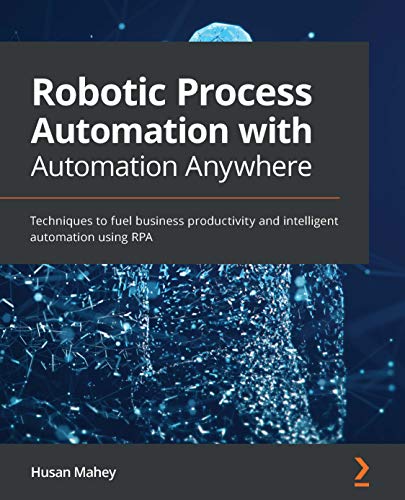
Robotic Process Automation with Automation Anywhere, by Husan Mahey
Automation Anywhere is certainly one of the biggest AI software company at the moment. The author shows real life examples of utilizing Automation Anywhere software solutions and how to implement these AI agents into your company.
From business process automation to handling tasks in Excel, Word etc. the book offers practical guides and examples to RPA engineers and consultants.
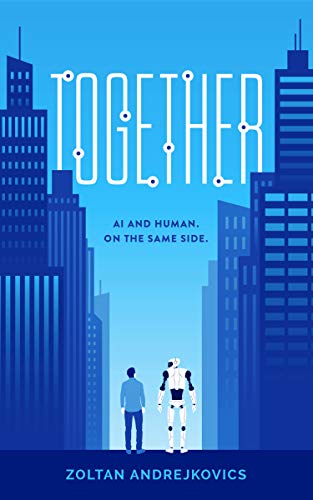
Together, by Zoltan Andrejkovics
This is one of the best AI introduction books out there for those who have real-world questions. The book includes topics like AI ethics, . While artificial intelligence can be an outstanding opportunity, it will also influence and change lives. People are still trying to figure out how to do it the right way before “robots take the world over”.
Now, how does artificial intelligence work? Who can truly benefit from such advanced technologies? Will “robots” be able to see things as we do it and think? How is this new future going to be? The author aims to reply to such questions in a more positive manner. He outlines the benefits of artificial intelligence in the world, as well as the possibility to come up with a better society.
You will find ideas connecting to the practical side of AI and the relation with workforce. The book also introduces some broader aspects of automatization and social impacts of it. You will also find trends, as well as examples of companies that thrive from using artificial intelligence. If you want to get clear insight how AI will “fit” into our society than this book will give you a help in this respect.
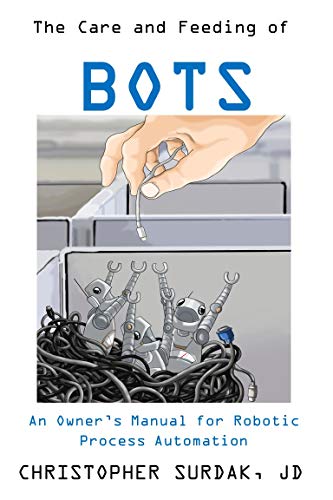
The Care and Feeding of Bots, by Christopher Surdak
The artificial intelligence industry has exploded over the past decade. It has become the quickest growing trend in the world – no doubt about it. By the end of the previous decade, the industry counted over $10 billion and it keeps going up. In general, the technology was seen as a blessing – companies get better, cheaper and more efficient at what they do. But then, will it actually help people in the long run?
So far, the reality has also shown the negative issues associated with RPA. The return on investment is great, but then, more and more companies started failing at implementing automated processes, rather than making serious advancements. Many organizations have abandoned this trend and realized it is too complicated. Failing to get the desired results, people often ask themselves – why is the technology failing?
The author describes the goods and bads of having robots do the work. Some bots succeed to a certain level, while others fail. Being directly involved with the industry, the author discusses the errors, failures and missteps associated with this industry. Discover the ways that could lead to failure and a few ideas to ensure you are successful – great for both tech freaks and business owners.
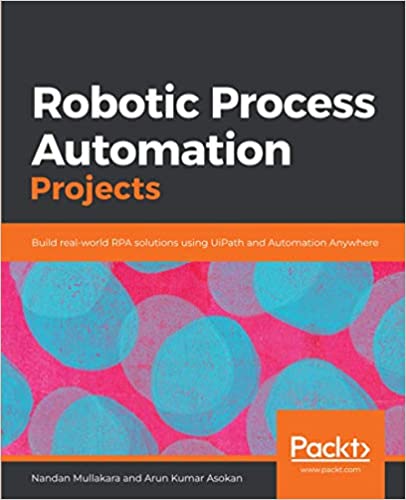
Robotic Process Automation Projects, by Nandan Mullakara
This is one of the best practical RPA books that introduce readers into the world of UiPath.
UiPath is another big RPA firm in the industry. In this book the author introduces ERP, CRM, Sales and HR robotic process automations, he tries to focus on real life workforce problems and processes.
The author utilizes a help desk ticket generation process to show the main concepts of RPA and the basics of UiPath. The book includes popular AI topics like artificial vision and automated workflows.
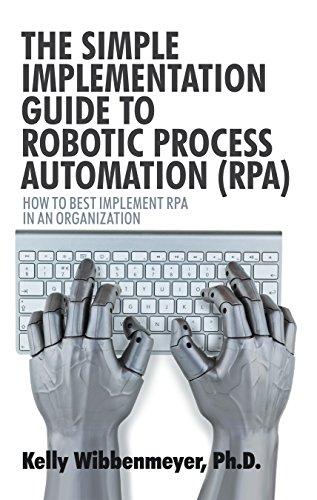
The Simple Implementation Guide to Robotic Process Automation, by Kelly Wibbenmeyer
Kelly Wibbenmeyer might have written one of the best RPA books for businesspeople or corporation owners interested in adding some automation to their processes. Whether it comes to increasing efficiency, saving money or improving working hours and productivity without breaking the law, robots can certainly help in the process if implemented and programmed correctly – lots of small details to consider.
Starting and implementing RPA into an organization is fairly simple, but there is one rule lots of people fail to overlook. Everyone wants to start big and make an impact. The truth is you need to start small. Keep it simple and go from there. If you try to make it more complicated than what you can handle, chances are you will fail before you even notice any improvements or benefits.
This is a practical guide to implement RPA into an organization. Learn how to overcome the most common problems in the process, carry out a great RPA implementation, find funding and get support from the people above you. The book also mentions the pros and cons of various ideas used by numerous organizations, making an excellent starting guide for those interested in RPA.
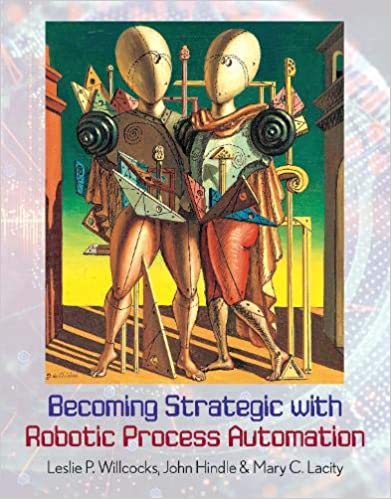
Becoming Strategic with Robotic Process Automation, by John Hindle, Leslie Willcocks and Mary Lacity
No one can deny it – RPA will keep growing and get better. While some fail at it, others succeed. There is a continuous battle to be the first at everything and the next decade will see some incredible improvements. There are dozens of vendors, all kinds of tools out there, AI platforms and so on – RPA is not just a trend, but a viable opportunity that no one can really ignore. How do you get a piece then?
This book is the result of four years of consistent research. It has analyzed over 420 business environments relying on AI. It identifies the most important practices among the top players on the market, as well as trends and ideas that can succeed in the long run. In other words, the book brings in a new idea over how RPA can affect a business with the right strategy.
There are numerous innovations to consider, management updates and so on. From some points of view, RPA can be seen as an actual platform that links various technologies. There are some central messages out there, demonstrated techniques, lessons, experiences, trials and errors. The book is more suitable for those who plan a career in RPA or corporate managers who want to adapt to the trend.
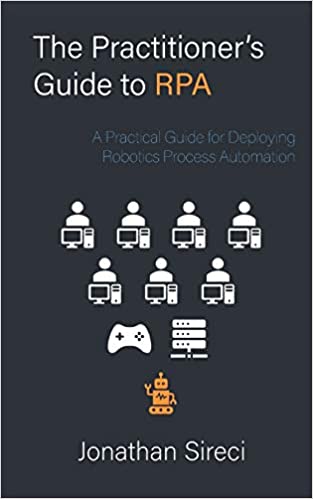
The Practitioner’s Guide to RPA, by Jonathan Sireci
You simply cannot ignore RPA. Robotic process automation is one of the most common technologies today. But at the same time, it is often misunderstood too. To those who have lost the battle with the tech advancements today, learning about this industry could be a serious challenge. This is one of the best RPA books out there to understand more about the technology and how it can affect your life.
RPA is often advertised to be a tool for artificial intelligence. But then, the truth is slightly different. You need to find out how it works and how to adjust it to your unique needs in order to make it efficient. This book introduces the reader to the struggles, ideas and plans a business practitioner may have in the process.
You will find out more about RPA, what it is, how it differs from artificial intelligence, what its architecture is and how to implement it. Learn about vendors, billing models, choosing the right vendor and building a professional RPA team. Further considerations for the actual workforce are also discussed about in this book.
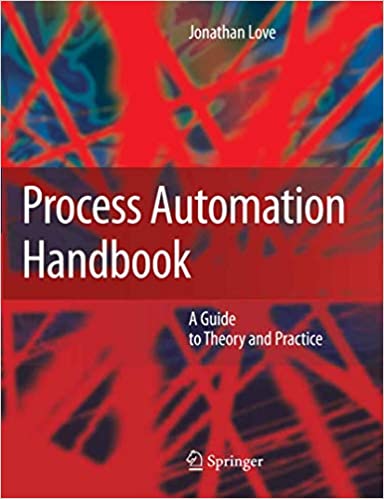
Process Automation Handbook, by Jonathan Love
Becoming a successful engineer in this field will most likely require plenty of knowledge. To be successful, you will require a bit of education over multiple disciplines – from mathematics and computing to chemical engineering and electrical engineering, just to name a few. The list can obviously go further than that for a more appropriate approach.
This is not the first book in this segment. However, many previous releases are quite generic. From all those books that go straight to the point, only a few of them discuss the chemical industry and the process technology. It is simply not practical enough for a modern RPA enthusiast to overlook such considerations.
The primary goal of this book is to bring in all the practical purposes of RPA in a single handbook. It underlines the domains you might need education on. Furthermore, each topic is backed by proper facts. There are further references for those who need to study more too. Bottom line, this book will be a great resource for anyone interested in RPA books.
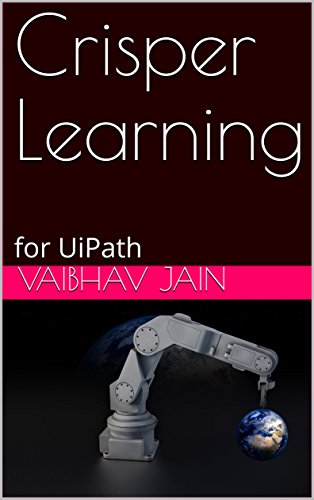
Crisper Learning, by Vaibhav Jain
This book has been written by the seasoned engineer with a bit of experience in RPA and artificial intelligence. In today’s world, professionals are supposed to work smarter and not necessarily harder. In order to retain their jobs or advance based on the trends, developers tend to focus on new tools and more sophisticated languages for their careers.
Work optimization is a must these days and this is when repetitive manual processes become a problem. Optimizing everything will improve the productivity. Such things are less likely to happen overnight. Technology takes time to develop, whether it comes to computers or smartphones – all these things can be classified as robots.
People are smarter than ever – you see children handling smartphones and finding the videos they like. RPA implies imitating jobs based on deep programming. It is a top notch substitute that will boost the productivity. There are numerous vendors out there and most of them rely on sophisticated automations – this book allows you to understand the process, learn how it works and discover UiPath, a top notch tool used to deliver.
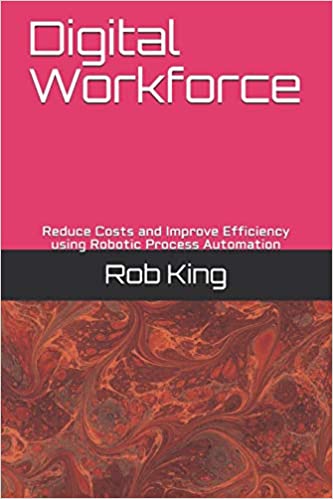
Digital Workforce, by Rob King
A couple of decades ago, RPA was nothing – just a random industry that no one has really paid any attention to it. Within a few years, it has managed to disrupt the workforce all across the world. According to numerous analysts, the industry is likely to keep growing and cause even more changes in the world. Now, where exactly is the truth? Are there any myths about it?
Some suggest that RPA should be seriously taxed. Some others come with predictions regarding job losses. The impact of the RPA is quite unknown and predictions go in two different directions. No matter what industry you work in, you will soon realize that RPA will affect it – rather sooner than later. As a business owner, you must act fast or your competition will get ahead of you.
But then, you find out that up to 50% of RPA technologies fail due to a poor implementation. Some vendors claim that RPA can be easily implemented, but this could be a myth. In this book, the author explains how various processes work and how they must be aligned to the business profile in order to become successful in the long run.
RPA Books: Conclusion
Bottom line, these are some of the best RPA books you can try out these days, whether you want to find out more about the technology, find answers to your questions, implement RPA into your business or join the programming workforce. There is something for everyone – find out what works for your needs and join the trend.
If you are looking for more AI non-fiction books check out the following article.
